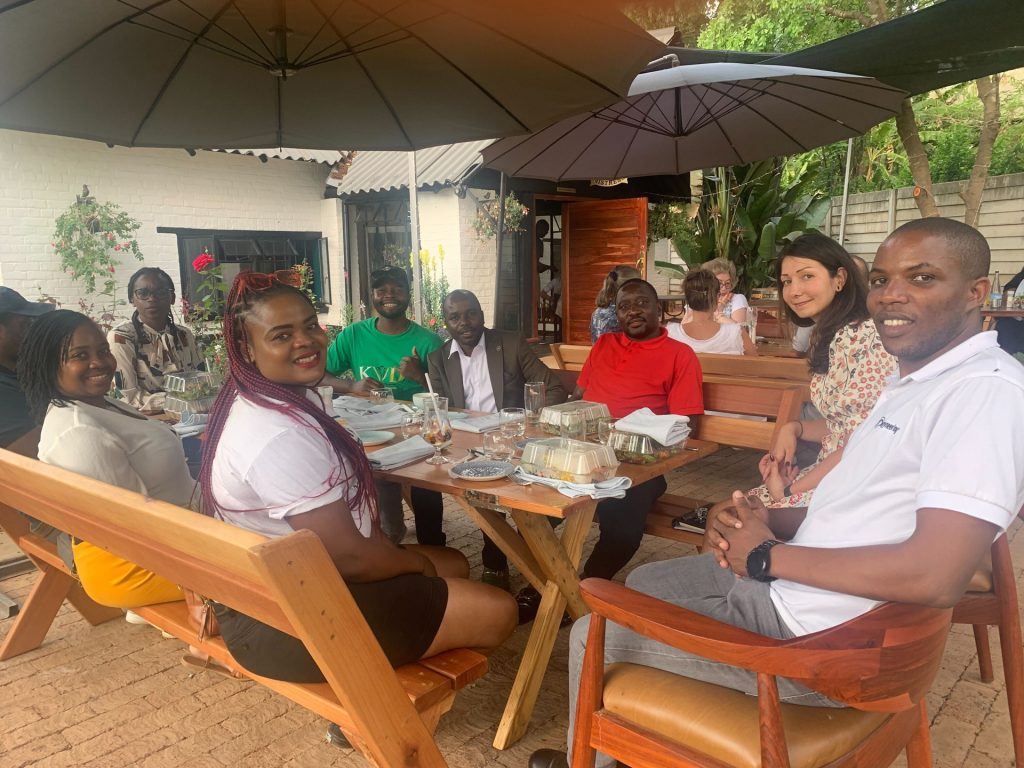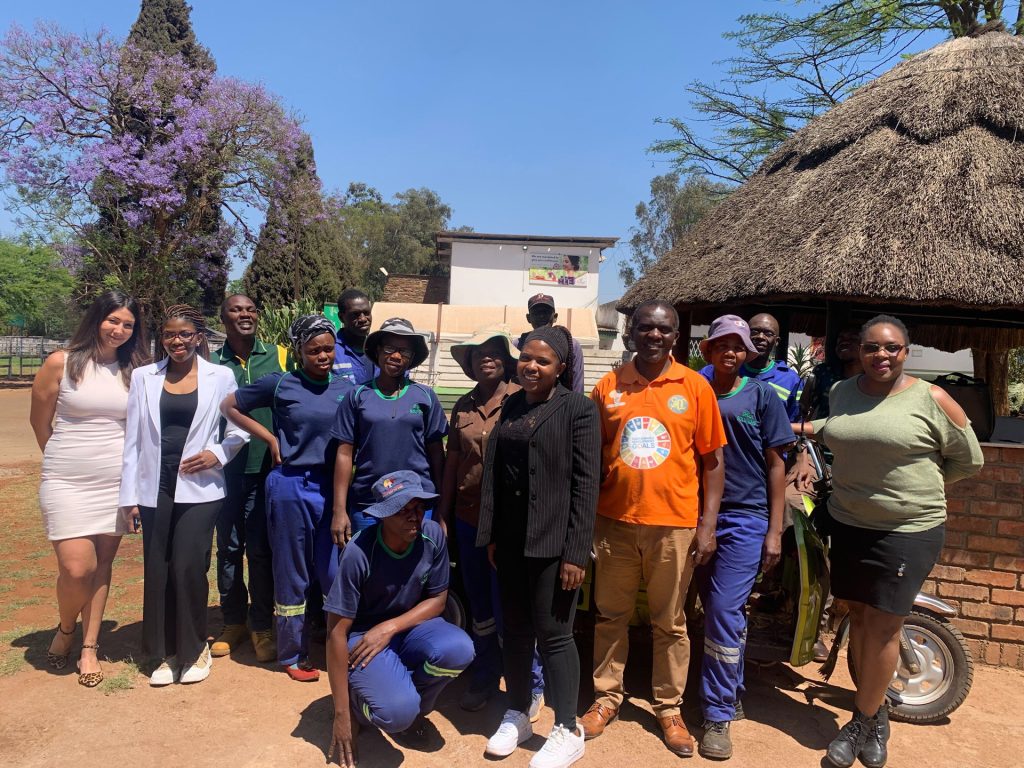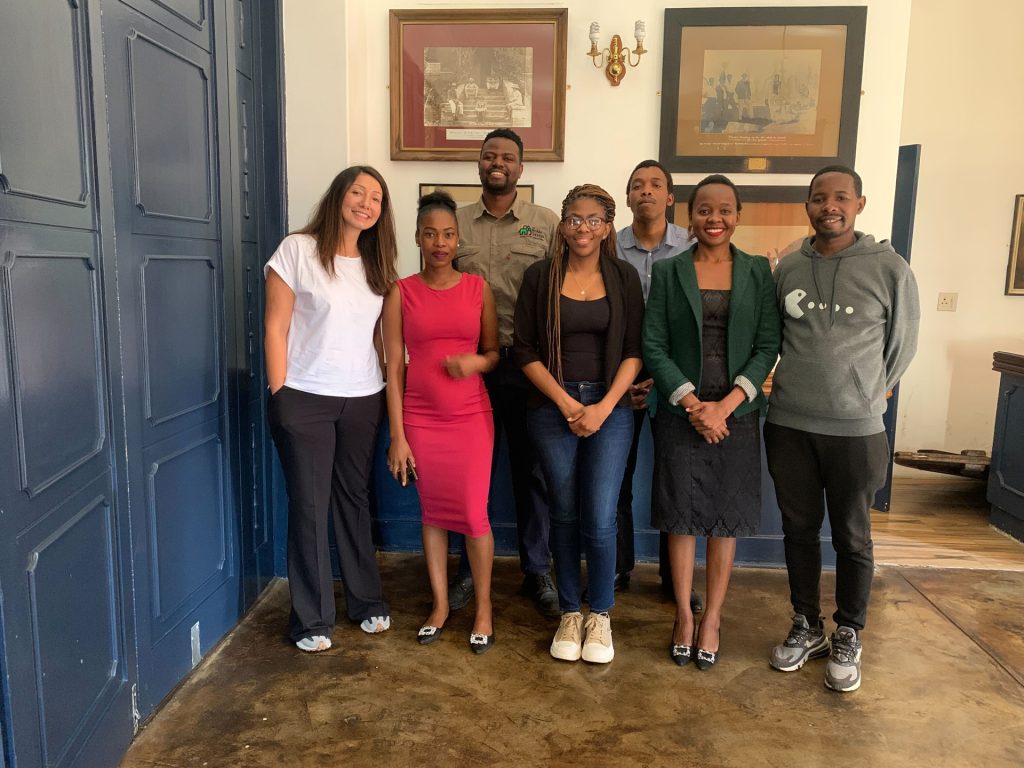Between August and October 2023, Catalystas Consulting, an intersectional feminist consulting group, supported the Dutch Enterprise Agency (RVO) and the Kingdom of the Netherlands Embassy in Zimbabwe by undertaking a Youth Entrepreneurship Ecosystem Mapping and Analysis. This research aims to inform the Dutch government’s understanding of and plans to support youth aged 18-35 who seek to be or currently are entrepreneurs in the waste management, agriculture, and information technology (ICT) sectors in the cities of Harare (the capital), Bulawayo, and Mutare, as well as surrounding areas.
The research and the recommendations for the Dutch government on how to contribute Dutch-specific niche interventions to help the target market were informed by the following data:
The research results indicated that Zimbabwe is a very youthful country, with 67.7% of its population aged 18-35. The country also has the highest rate of literacy and education on the African continent (with a 93.7% literacy rate). However, the government has had significant challenges to democratic processes since its independence in 1980. It exhibits one of the highest rates of hyperinflation in the world (280% in 2022 alone, according to the World Bank) and one of the world’s fastest rates of currency devaluation (a 53% decline in value just from January to May 2023), which are largely due to international sanctions; high levels of corruption as well as stifling and rapidly changing bureaucratic processes; taxes; and deteriorating infrastructure (electrical, transport, telecoms). Despite these many challenges, Zimbabwe has a notable track record of entrepreneurship among its diaspora, who are seen as industry leaders in numerous countries in Africa, North America, and Europe. Similarly, the entrepreneurial spirit, often created out of necessity for income generation, was observed across youth in Zimbabwe. However, many youths in Zimbabwe face significant challenges in pursuing entrepreneurship, including those related to a lack of access to resources, business knowledge, education, finance, and the market; additionally, there are barriers related to significant levels of corruption as well as a lack of supportive governmental measures for startups, youth businesses, and international trade.
Barriers particularly exist regarding access to finance and the burdens of the bureaucratic processes of business registration, tax registration, and licensing, which are not streamlined due to the lack of a Startup Act in Zimbabwe. Lack of incentivisation for business, combined with low levels of government oversight, translates to 64.1% of Zimbabwe’s economy being informal, according to the International Labor Organization (ILO). Furthermore, the economic woes of the government have disincentivised innovation due to the following: high import tariffs on products and materials brought in from outside the country (even when equivalent products/materials are not produced locally); 30% of all import- or export-related transactions is required to be converted into the local currency. For businesses that provide services and products abroad, all transactions are converted in part to the local currency, which is impacted by rapid hyperinflation and devaluation – automatically resulting in major losses in revenue. For businesses that import products, access to critical materials, technologies, and services required to innovate becomes even more expensive and, in many cases, even less viable. Despite these limitations, the overwhelming majority of youth-owned businesses that were on a trajectory towards scalability during the research were overcoming currency instability by catering to regional and international markets – this was achieved through opening either a conglomerate or a branch in a neighboring country and operating international transactions through it; opting for local fabrication of source materials when possible; or by creating products and services that, due to value and demand, could withstand a price increase of 30% to offset the impact of the currency exchange rules.
Currency challenges also result in the Reserve Bank of Zimbabwe controlling the lines of credit provided by financial institutions. These financial institutions can only provide loans for no more than 12 months, with an average interest rate of 10% and 22% for USD-denominated loans. In addition, the loans are subject to traditional collateral requirements related to immovable property. The challenges mentioned above all stem from macroeconomic policy structures and create barriers to innovation, international business trade, and access to finance for the private sector; these challenges create even greater burdens and barriers for youth entrepreneurs who often do not have the capital, collateral, or market access necessary to receive the significant financing required to create growth-oriented startups in any of the three focus sectors – all of which require high capital investment for expansion.

It was also noted by many financial institutions and associations as well as by youth entrepreneurs themselves that while registering a business was not particularly challenging in Zimbabwe, having tax compliance, which requires financial literacy, regular filing, and compliance, was exceptionally challenging. The study showed that even though 67.7% of the youth entrepreneurs who took part in the survey had registered their businesses, based on responses about their financial management systems, it can be concluded that there is a high likelihood that more than half of the respondents are noncompliant with tax regulations and thus not able to access formal financial support and therefore affects the potential for scalability.
During the course of the research, it was found that numerous NGOs and multilateral institutions are focused on entrepreneurship; however, most address the lowest part of the economic pyramid – labeling poverty alleviation programming as entrepreneurship programming, which in reality does not lead to growth orientation or scalability. While some programmes provide training that is informed by market research and relates to technical products or services, many of the programmes do not go so far as to provide training related to business practices, and they do not provide access to significant enough finance to help businesses grow.
It was also noted by much of the private sector and associations that it is rare for nonprofit-focused programmes to effectively interlink into the existing Zimbabwean private sector to create effective linkages. While the research did note a few programmes that are doing otherwise, the researchers’ findings echoed the remarks of several private sector actors. Associations are transforming themselves slowly depending on the sector and focusing on including youth-focused programming and support – this is happening primarily in the area of agriculture, somewhat in ICT, and not at all in waste management. Additionally, there is one association for SMEs, the Zimbabwe SME Association, but it does not specifically focus on youth business needs. This insight was further qualified by the fact that, in surveys as well as in focus group discussions, the majority of youth business owners indicated that they were not members of a business association, and over 40% noted that they believed many of the existing associations did not have youth business interests in mind. While there are numerous youth associations in Zimbabwe, none focus specifically on entrepreneurship, small business, and youth-specific needs; groups such as Youth Empowerment and Transformation Trust (YETT) have been noted to report on entrepreneurship and youth, but they do not have a specific strategy for promoting youth-owned business interests and representing their needs. As such, the research found that youth-owned businesses’ needs and interests are deeply underrepresented to government officials, and lack of participation in associations limits youth-owned businesses’ access to the market.
Regarding training programmes aimed at youth, while only a few associations have some training programmes of this sort, universities across the country have as part of the Education 5.0 programme created innovation hubs that produce entrepreneurs (albeit slowly and relatively expensively) as well as the existence of over 40 different privately operated Incubators Hubs. Incubator hubs in Zimbabwe are large and provide space for entrepreneurs to come to a centralized location to access the internet. Outside of some exceptional cases, most entrepreneurship programming did not provide the capacity development and support required for youth entrepreneurs to bring their businesses to market and to scale those businesses. It was found that the majority of incubators also suffer from low demand, which is due in large part to a lack of demonstrated output of successful entrepreneurs. Instead, many of them, like some of the serial youth entrepreneurs who are members of such incubators, are highly dependent on grant funding. In some cases, grant funding has supported exceptional projects to come to life, notably as part of Impact Hub and its programme. It has sometimes provided an international platform for youth entrepreneurs to gain investor interest. However, a troubling trend has been noted by numerous respondents: Most hubs and entrepreneurs are aid dependent, requiring constant change to and adaptation of business models to win funding competitions but not necessarily to match market needs. By and large, the entrepreneurs who were seen as most likely to succeed and create scalable businesses noted that they had participated in numerous training programmes, both local and international; they often attributed a deep importance to finding mentors who could coach them and help their businesses. It was noted by the overwhelming majority of survey respondents that there was a deep desire for business, marketing, and sales training, financial accounting, and, finally, mentorship.
Based on responses to a survey distributed via associations, NGOs, and educational institutions, many youth entrepreneurs were found to be in the micro-entrepreneurship category (40%, with less than 2,500 USD annual turnover) and the small business category (18.3%, with a turnover between 2,500 and 8,000 USD per year), and more than half (62.2%) identified as solopreneurs (operating independently). Many of the businesses indicated a lack of long-term perspective and patience due to survivorship. Instead of pivoting and adapting to grow, they are pivoting and adapting to survive in the current economic environment.

The majority of youth-owned business respondents noted that they had self-financed their business or financed it through “family and friends” funding and that 73.5% have never applied for a loan (due to a lack of will, banking conditions, or feeling after self-assessment that they do not qualify). It was found that only one-third undertake any form of business accounting; however, more than 67% had registered businesses (that are likely not tax compliant). The majority (70.5%) of youth-owned business respondents noted having an online presence, and 54.1% considered themselves a technology-based business.
When it comes to gendered impacts on youth entrepreneurship, the research found that, as in the rest of the world, young Zimbabwean women face additional barriers, such as unpaid care labor responsibilities based on patriarchal societal structures and lesser access to finance due to even lesser access to collateral. However, women in Zimbabwe are nearly at parity or even surpassing their male counterparts in terms of earning skilled diplomas and higher education (undergraduate) degrees, according to ZimStat, the authority for internal demographics. Similarly, according to Zimbabwe’s Central Bank, between 2016 and 2022, the number of women opening bank accounts increased by 204%. Furthermore, Dr. Kosmas Njanike’s 2019 empirical study “The Factors Influencing SMEs Growth in Africa: A Case of SMEs in Zimbabwe,” which surveyed more than 3,222 people face to face, found that business there is no longer determined by marital status, as individuals can make independent decisions or make decisions aimed at promoting a business. It is, therefore, necessary to acknowledge differences and diversity among women according to class, race, and ethnicity as important factors influencing women’s circumstances for autonomy and well-being socially, politically, and financially when considering supporting women’s entrepreneurship rather than gender alone.

Regarding each sector, the research found that agriculture, which accounts for 20.3% of the economy and 61.6% of the workforce, exhibits a lower level of interest among growth-oriented youth entrepreneurs than the other two sectors – yet agriculture has the highest level of focus from multinational NGOs and responsiveness by business associations to youth needs (via the Zimbabwe Farmers Union).
When youth businesses are supported in the agriculture sector, the training and support offered to them often fall into the technical production or processing side of the value chain rather than traditional business training covering topics such as financial literacy, conglomeration, sales, marketing, and export readiness.
Among youth entrepreneurs with potential for scalability working in agriculture-related sectors, there was a deeper concentration on end value chains such as processes, advisory services, and distribution, all of which offer a higher return on investment compared to production or early-stage transformation. There were, however, limitations even for youth entrepreneurs operating in the agricultural sector – largely due to a lack of access to significant enough finance with attractive or even fair lending terms. This results in a vicious cycle of remaining in a microstate of business operation, reflected in the finding that among youth entrepreneur survey respondents working in the agriculture sector, the majority (87.2%) have less than 2,500 USD in yearly turnover.
The waste management sector has great potential, but its growth is limited due to challenges around finance. The middle and end of the value chain are not accessible to many young entrepreneurs due to a lack of access to the significant capital needed to be able to enter into circular production and manufacturing. As such, the early stages of the waste management and recycling value chains are highly saturated, with more than 75 established players operating in the recycling of plastic pellets (HDPE, LDPE, and PP); however, the management of waste such as medical waste, e-waste, and organic waste was found to be underdeveloped, likely due to high cost and the deeper level of technical know-how needed for handling. Waste management, especially in the areas of recyclable material collection and initial stages of production, is largely dominated by youth-owned enterprises.
These businesses often focus on the low-cost initial stages of plastic waste recycling, such as waste picking, initial separation or cleaning, and packaging and production. While these parts of the waste management value chain offer poverty alleviation job opportunities for numerous poor people (often youth, women, and children), the industry, like much of the economy and labor market, is largely under-regulated, which poses a potential for exploitation and risks of child labor if this lack of regulations is left unaddressed. These risks can easily be overcome through effective government programming and incentives for ethical practice, and the sector could be seen as one of the most viable for effective scalability. Opportunities in waste management go far beyond the three underserved types of waste management mentioned above, as there are significant gaps in service provision in the management of the 1.65 million tonnes of waste produced annually.
In regards to recyclable materials, the market for waste pickers and sorters, while booming, is deeply dependent on South Africa, the major destination for most plastic, glass, and paper waste since the shutdown of many of the smaller recycling plants in Zimbabwe during the COVID-19 pandemic. Dependency on the South African market, however, is a risk and should be addressed due to significant contraction in the purchasing of waste by South African companies, stemming from the inability to process waste because of energy shortages that plague the country.
This could be dealt with through effective funding and support for local processing and manufacturing plants and services. While the required initial investments in the sectors are high, there is an interesting opportunity based on the deep need and demand for locally sourced materials due to currency conversion and import taxation. The study already identified innovative youth businesses working specifically in the area of small-scale material fabrication to fill this exact market using waste materials and services. It is also worth mentioning that EMA, the waste management authority, is highly interested in partnership with the private sector to address the pressing environmental and health challenges facing the country; furthermore, EMA has noted that it is soon passing a new policy geared at facilitating the growth of the waste management sector.

Regarding the three different locations of this study, Harare, the capital, offers much more opportunities than Bulawayo or Mutare in terms of access to training, markets, and other opportunities. In addition, the fact that the capital has the lowest poverty level (36.4%) compared to rural locations (as high as 85.7% in the north) makes the purchasing power of consumers and investors stronger in Harare. The research found a deep focus on ICT and digitization-focused business training programs compared to the other locations. The capital also shows the highest concentration of social media sales (somewhat uncommon in the other cities of the study). The digital and digitization solutions focus in Harare does, however, face the challenges around market share and financing noted regarding the ICT sector. The research also noted that numerous entrepreneurs talked about issues with intellectual property theft and only being able to get funded by larger companies and businesses, which required majority sale or exclusive privileges in return for financing the entrepreneurs’ solutions.
In Bulawayo, Catalystas found less access to markets and financial services than in Harare due to deeper economic hardship (41.8% of the population was considered to be in poverty in 2019). The research found that more of the youth-run businesses met in Bulawayo focused on the fabrication of materials and products compared to the other two locations. Like many other youth-run businesses in all three locations, these businesses, although buoyant, have been bootstrapping for years, and many of them remain informal and cannot expand and grow. Youth in Bulawayo face major challenges with access to financing. As a result, many respondents young entrepreneurs met with during the research noted when businesses get serious, they often go to Harare, where the action happens, to have access to both financing and markets. Bulawayo’s entrepreneurship culture and hubs have helped to support the start of several successful youth-owned startups in all three sectors thanks to a vibrant entrepreneurship-focused community of hubs, pitch nights, and international trade fairs; however, since COVID-19, these have dried up for the most part. The Bulawayo city council itself has its own parallel registration system, especially for informal vendors, which constitutes city but not countrywide business licensing.

This creates a legal grey area for vendors and traders in the city. These businesses were observed to be hindered from developing and expanding due to a lack of access to the training and effective financing that would help them become formalized and growth-oriented. The situation in Bulawayo countryside was noted to be particularly fraught for young entrepreneurs who, in large part, focus on the agriculture sector. Respondents noted that these young entrepreneurs are migrating in droves to South Africa due to the lack of opportunity in their marketplaces.
In Mutare, the research found that youth entrepreneurs have the least access to markets, financial services, and service provision. The city was also observed to have a deeper level of economic hardship compared to the other two locations of the study, with 61%-72% of the population living in poverty in 2015. Youth-owned businesses in Mutare operate in all sectors, but there is a concentration related to agriculture. However, it was noted by numerous stakeholders that youth are, in large part, abandoning agriculture in pursuit of dangerous artisanal gold mining or migrating to South Africa in search of more lucrative opportunities that offer a pathway out of poverty. The research found that Mutare has a deep lack of service provision, as there were very few NGOs, incubators, hubs, or entrepreneurship or business associations identified in the area. Similarly, youth entrepreneurs from Mutare noted during discussions a need to go to Harare, “where business happens,” to access markets. Like the other two locations, Mutare’s youth face major challenges in accessing the significant financing required to help their businesses scale and grow. Unlike the other two cities, however, Mutare has little representation of interconnection and entrepreneurship culture; all youth entrepreneurs met with noted no knowledge of a business association and a lack of mechanisms for business owners, mentors, and service providers to be interconnected to each other – although this was highly desired.
These overarching insights are part of the in-depth study, which includes recommendations for Dutch-specific niche interventions to support the youth entrepreneurship ecosystem in Zimbabwe. Programming based on insights from these findings is likely to take place over the next three to five years.

“Zim maintains high literacy rate in Africa“, The Herald, 2023
Ray Ndlovu, “Zimbabwe Devalues Its Dollar to Try Stabilize Currency”, Bloomberg, 2023
World Economics, “Zimbabwe’s Informal Economy Size”
“Are Zimbabwean women more educated than men?”, ZimPrice Check, 2022
Kosmas Njanike, “The Factors Influencing SMEs Growth in Africa: A Case of SMEs in Zimbabwe”, Chapter Metrics Overview, 2019
There are currently no other publically available more recent figures for poverty levels in Mutare available at this time. GDL Area Profile Report Bulawayo (Zimbabwe)
USAID, Poverty and Malnutrition in Zimbabwe: Findings from Manicaland Province, 2020
An Iranian-American with more than ten years of experience in international relations, economic development, and political empowerment, Beatrice is heavily invested in making the world a better place. Her work spans multiple regions of the world, often including high-risk environments, and her clients include non-governmental organizations, governmental bodies, and small-to-medium–sized corporations throughout the US, EU, Middle East, and Sub-Saharan Africa.
Originally focused on the areas of economic development, security, and disarmament, Beatrice turned to the humanitarian field, where she has expanded her expertise to include international security policy, gender equality, and innovation planning. She is a highly skilled grant writer, program designer, auditor, and capacity and impact assessor, as well as an authority on client and donor relations and ethical corporate engagement strategy.
Her personal and professional interests come together in the use of technology and data to provide solutions and insight into human rights, higher education, sexual reproductive rights, and environmental preservation.
We built Lysta as an answer to one of our own problems: the need to quickly assemble teams of experts across various subject matter, geographic, linguistic, and thematic areas for projects and proposals as they arise. We quickly realized that we were not the only ones facing this challenge! With the speed that development projects require hiring, turnaround, and technical insights, we see first hand how helpful it is to have a ready-made database of vetted experts to call on.
For existing and potential Clients, you can access all consultant full profiles by signing up here as a client for free.
For consultants, adding your profile to Lysta means jumping to the top of the list for our clients in recruitment processes. We do the heavy lifting: the CV reviews, interviews, vetting, and personnel management; so when our clients come to us, they know they’re hiring someone they can trust to deliver high quality, timely results. Click here to add your profile for review.
We’re proud to be a link in the chain that connects the best of the best – don’t hesitate to reach out and see how you can put Lysta to work for you!